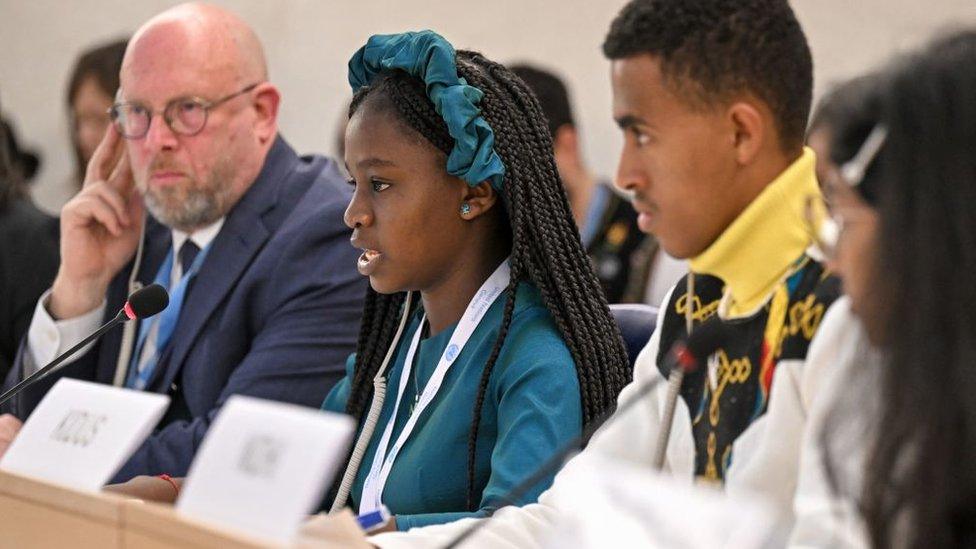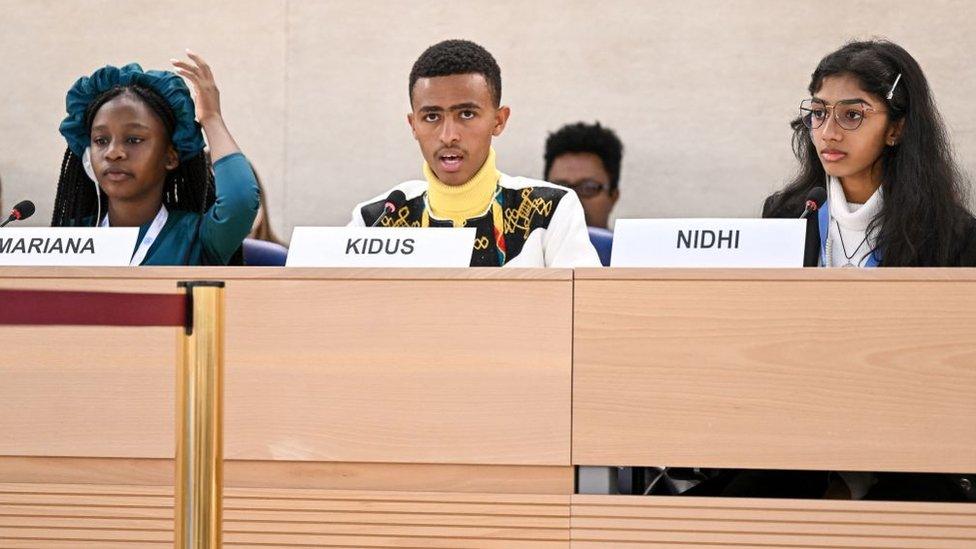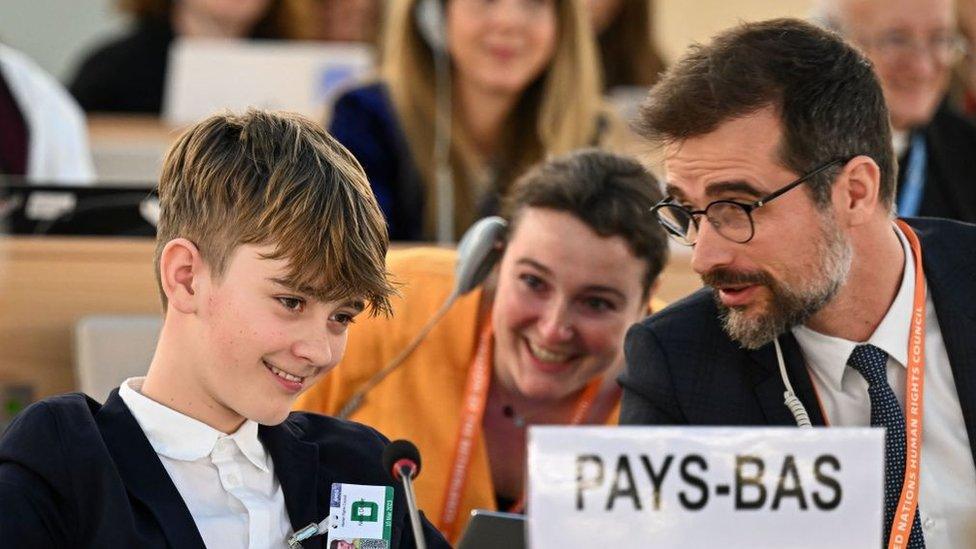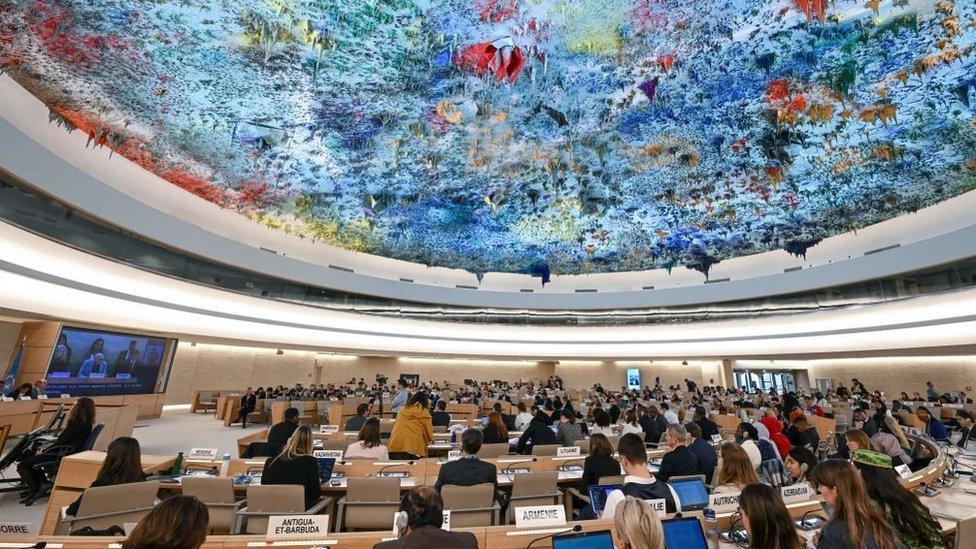Children call UN for better internet access and protections online
- Published
- comments

12-year-old Colombian human rights defender Mariana delivers a speech during a panel on children's rights and the digital environment to mark the annual day of the child
Many of us would probably struggle if we were without technology for even a day - but in many parts of the world access to things like the internet often isn't an option.
This is something many young people from countries including Colombia, Ethiopia and Malaysia are campaigning to see change.
Some of them have travelled to Geneva in Switzerland to speak at a special event at the United Nations Human Rights Council, calling for universal internet access and greater protection for young people online.
Now their arguments have been backed by a special report from the Special Representative of the Secretary-General on Violence against Children, who described protecting children online as "a critical issue".
Who are the young people and what did they speak about?

12-year-old Mariana from Colombia, 16-year-old Kidus from Ethiopia and 14-year-old Nidhi from Malaysia were all part of the panel on children's rights and the digital environment
Normally the event would have been filled with ambassadors, who come as representatives from their country to speak about the issues important to them.
But this time children replaced some ambassadors, with the majority of people on the panel under the age of 18.
This is when people don't have the same access to technology as others.
It can include things like phones, laptops and tablets, or also an internet connection.
The digital divide can happen for lots of different reasons, for example families not being able to afford devices, or lack of internet connectivity where they live.
It can make it harder for young people to get the most out of their education and future.
Issues with tech make home learning 'difficult and frustrating'
Mariana, aged 12, lives in southern Colombia and travelled to the event because she wanted to make her feelings known on the digital divide.
She asked the council: "If technology and the internet are part of everyday life for people around the world, why... is this right still not accessible for all children?"
She highlighted statistics showing that less than a third of households in rural Colombia have internet access at home.
I distinctly remember when I was about nine years old, how scared I was when I saw a scary image while exploring a game on the internet.

12-year-old Dutch representative Nesta de Bie was among those who spoke on the panel
Nidhi, a 14-year-old podcaster from Malaysia, also drew the panel's attention to the issue of online safety.
She argued that a third of all worldwide internet users are children, but that people her age often "don't even know how to use online tools safely or preserve their personal information".
She told the council that estimates say that on average 72 million pieces of personal data are collected from every child worldwide before they turn 13, which she called an "unethical and a violation of children's online space".
Nindi also talked about how young people can often come across inappropriate content by accident.
The United Nations - often called the UN - is a worldwide organisation, that brings countries together to talk about, and try to agree on, world issues.
The Human Rights Council is an organisation made up representatives from 47 different countries within the UN, who meet to discuss how to promote and protect the rights of people around the globe.
These rights include for example protection towards things like privacy, or certain characteristics like race, sex, nationality, ethnicity, language, religion.
Kidus, from Ethiopia, warned that digital technology "poses serious challenges affecting (children's) well-being and rights".
The 17-year-old spoke of how children can also be vulnerable to not only things like cyberbullying, but also to being contacted by people online can put them under pressure to take part in illegal activities.
He called for the UN to take action and introduce stricter laws to help protect children from "all forms of violence, abuse and exploitation in the digital environment".
What has the response been like?

Children from around the world took the floor at the UN Human Rights Council to demand universal internet access, and protection for young people in digital environments
United Nations High Commissioner for Human Rights Volker Turk, who spoke alongside the children at the summit, said he agreed that the digital divide was a serious issue.
He said that "a staggering 2.2 billion children and young people under 25 around the globe still do not have access to the internet at home" - something he told those gathered they should be concerned about.
"They are left behind," he warned, adding that "it may be time to reinforce universal access to the internet as a human right, and not just as a privilege".
Following this event and the new report from the office of the Secretary General, the Human Rights Council met to discusses how to best to move forward on this issue.
The report said that child safety online should be protected more than ever, and that this could be done through raising more awareness among children and families, as well as providing more money and resources for law enforcement to investigate and protect children against potential threats.
It also said that children and their views and experiences should be part of the solution. It argued that that digital divide, which affects millions of children worldwide, should not be forgotten.
